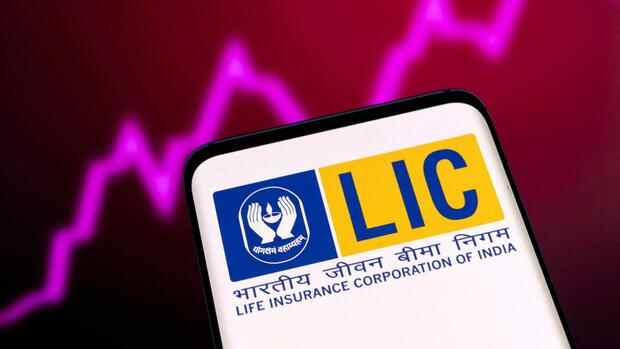Bangkok India’s stock markets are experiencing a spectacle like the Germans were last shown a quarter of a century ago with the first listing of Telekom shares: A state-owned company is to have the largest IPO in the country’s history – with the support of millions of private investors.
The insurance giant LIC, whose name almost every Indian knows, has used its network of 1.3 million sales representatives in recent weeks to drum up drums for itself even in the smallest villages. In addition to a flood of newspaper advertisements and TV commercials, the group also wrote to its customers – a quarter of a billion people – directly via SMS in order to turn its shares into an Indian people’s share.
The advertising offensive seems to be working: Already several days before the subscription period ending on Monday, the demand for the paper was higher than the supply. A special contingent for existing customers who receive a discount when buying shares is oversubscribed several times. Investors are not deterred by the market turbulence caused by the Ukraine war or by the turnaround in interest rates. In addition to the USA, India’s central bank also raised interest rates on Wednesday, surprising the financial markets.
The reason for the great interest of investors in the Life Insurance Corporation of India (LIC) is likely to be the price of the shares, in addition to the intensive PR campaign. Just a few months ago, the government was aiming for a company valuation of around $160 billion.
Top jobs of the day
Find the best jobs now and
be notified by email.
But in view of the geopolitical upheavals after the Russian invasion of Ukraine and concerns about global growth, it had to scale back its high ambitions significantly: At the upper end of the fixed price range, the LIC is now valued at just under $80 billion – slightly less than Allianz’s market capitalization.
The opposition senses a scandal
Analysts speak of an extremely attractive price for the former monopolist, which still has a market share of more than 60 percent more than two decades after market liberalization and, with assets of $500 billion, manages more than three times as much capital as all private competitors combined .
The valuation now roughly corresponds to the value of the insurance portfolio, the so-called “embedded value” – and is therefore at a similar level to other large insurers abroad. However, the competition within India is two to three times as expensive in terms of this indicator.
The opposition already senses a scandal in view of this comparison. The Congress Party accuses the government of Prime Minister Narendra Modi of selling state silverware at dumping prices. In a letter, she asked how it could be that the rating was reduced so much in just a few weeks. “Why is the government trying to sell the LIC while the markets are in the midst of turmoil?”
One answer to this is: You need the money to plug budget gaps and to slow down the new borrowing, which is already at a record level, at least a little. The sale of 3.5 percent of the LIC shares is now expected to bring in around $2.7 billion for the state treasury.
Authorities originally hoped to get up to $8 billion for a five percent stake. But they still want to break the previous IPO record: the operator of the Indian payment service provider Paytm raised 2.5 billion dollars last year, making it the largest IPO on the subcontinent to date.
However, the immediate proceeds are not the only reason for the government to list the LIC: It also believes that financial market control will force the giant state-owned company with its more than 100,000 employees at 3,500 locations to be more efficient in the future.
As anchor investors, the sovereign wealth funds from Norway and Singapore, among others, will accompany the development of the group, which is one of the five largest life insurers in the world in terms of premiums received of around 56 billion dollars a year.
Before the first day of trading, which is scheduled for May 17, many analysts were optimistic that the investment in the company will pay off – and that the Indians will be spared a similar flop that many German investors had to accept with the T-Share . LIC investors should expect fluctuations in the short term, commented Bhaskaran Gopkumar, head of securities dealer Axis Securities. “In the long term, however, we see the development as positive.”
The fact that the LIC is increasingly losing market share to the competition does not deter him. He points out that life insurance coverage in the country with a population of 1.4 billion is still very low in an international comparison. As a result, there is great growth potential for the entire industry.
More: These Indian tech companies excite investors and Silicon Valley
